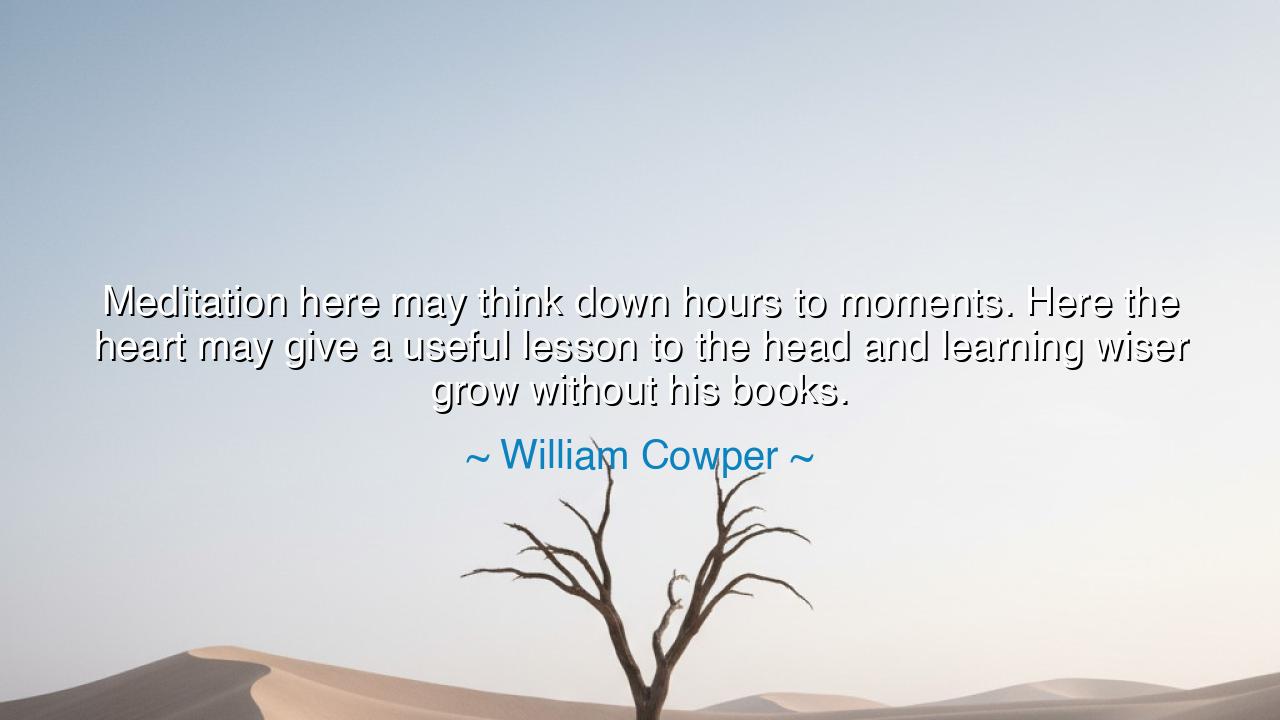
Meditation here may think down hours to moments. Here the heart
Meditation here may think down hours to moments. Here the heart may give a useful lesson to the head and learning wiser grow without his books.






When William Cowper wrote, “Meditation here may think down hours to moments. Here the heart may give a useful lesson to the head and learning wiser grow without his books,” he spoke as both poet and sage, revealing a truth as old as philosophy itself—that wisdom is not found solely in the pages of study, but in the stillness of reflection and the quiet dialogue between heart and mind. His words were born of solitude, from a man who wrestled with melancholy yet found solace in the simplicity of contemplation and nature. In this line, Cowper teaches that there exists a deeper form of learning—one untouched by ink or lecture—a wisdom that flowers only when the soul listens inwardly, when time itself is dissolved by the power of thought.
Cowper lived in an age of Enlightenment, when reason reigned supreme and intellect was worshiped as the crown of man. Yet, unlike many of his contemporaries, he saw that intellect alone was barren without the warmth of feeling. To “think down hours to moments” is his way of saying that meditation compresses time—that when one turns inward, the long passage of hours becomes as brief as the beat of a heart, for the mind, absorbed in truth, transcends the limits of the clock. In the garden of the spirit, a single moment of clear reflection can yield more wisdom than years of restless study. Meditation, then, is the great equalizer: it allows the humble soul to grasp truths that scholars may spend lifetimes chasing.
But Cowper’s second insight is even more profound: “The heart may give a useful lesson to the head.” Here, he reverses the hierarchy of his age. The intellect, he says, must learn from the heart—that seat of compassion, intuition, and humility. For all the brilliance of human reason, it is often blind to the deeper meanings of life. The head may measure and analyze, but it is the heart that feels the pulse of divine order. To live wisely, Cowper reminds us, the two must be reconciled: the intellect guided by empathy, and emotion enlightened by thought. True wisdom, he teaches, is born not from knowing much, but from understanding deeply.
The story of Marcus Aurelius, the philosopher-king of Rome, illuminates this truth. Though trained in Stoic logic and schooled in the art of empire, he turned often to solitude, journaling his reflections in silence amid the chaos of war. His Meditations—written not for fame, but for the cleansing of his own soul—became one of the most enduring works of philosophy. Like Cowper, he knew that the quiet mind becomes the wise mind, and that reason alone, without reflection and compassion, breeds only pride. In the stillness of his tent, he learned more of life than in all the marble halls of Rome.
Cowper’s phrase, “learning wiser grow without his books,” is not an attack on knowledge, but a plea for balance. Books are vessels of wisdom, but they are not wisdom itself. The greatest truths—love, forgiveness, mortality, purpose—are not taught by pages but lived through experience. A man may read a thousand treatises on virtue and still fail to be virtuous, for until his heart is stirred, his knowledge remains inert. Cowper believed that nature, contemplation, and prayer could awaken this deeper awareness. “Without his books” means not rejecting study, but transcending it—allowing the heart’s quiet lessons to refine what the intellect has gathered. It is the harmony of mind and soul that creates understanding.
In our hurried age, Cowper’s words ring like a bell through the fog of noise. We are surrounded by information but starved of wisdom, endlessly learning but seldom reflecting. The poet’s counsel is clear: withdraw from the clamor, if only for a while, and listen to the silence within. Let your thoughts settle like dust in still water, until the truth beneath becomes visible. Allow your heart to teach patience to your mind, and your mind to give form to your heart’s longing. In this sacred exchange, you will find a knowledge no library can contain.
So let the teaching of Cowper be passed to all seekers of truth: seek stillness, not accumulation. Do not mistake learning for wisdom, nor thought for understanding. A single hour of deep meditation may reveal more than a decade of study, if your heart remains open and your mind humble. Sit beneath the sky, walk among trees, or rest in the quiet of your own breath—there, let your heart speak and your mind listen. For when the heart instructs the intellect, the soul grows whole, and man becomes not merely learned, but wise.






AAdministratorAdministrator
Welcome, honored guests. Please leave a comment, we will respond soon